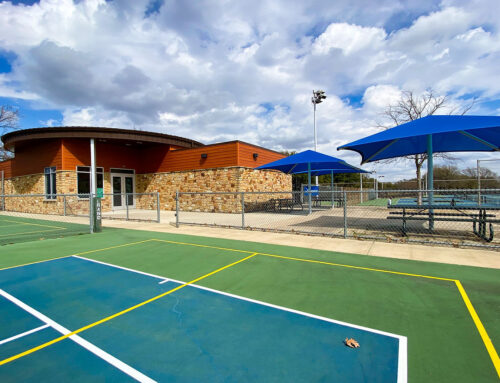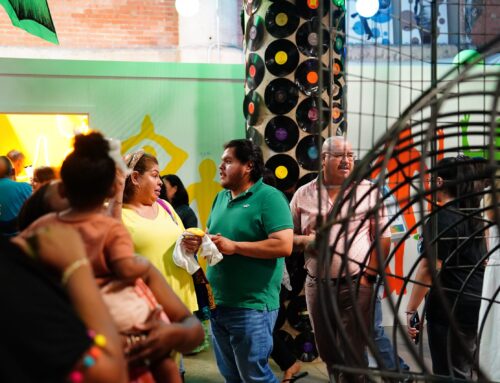No one said high school was easy. From the social challenges to the expectations, all students in the class of 2017 have struggled for their achievements. But some students faced adversity well beyond their young years, hardships that would be tough for even seasoned adults to navigate. They had to learn to fit into a world that didn’t always accept or understand them. These are the students who could have fallen through the cracks, thrown in the towel or simply walked away from a life that seemed to take more than it gave. Instead, when the world pushed them, they fought back, refusing to succumb to the strife. Their grace in dark times made them into unlikely role models who demonstrate what it means to never give up.
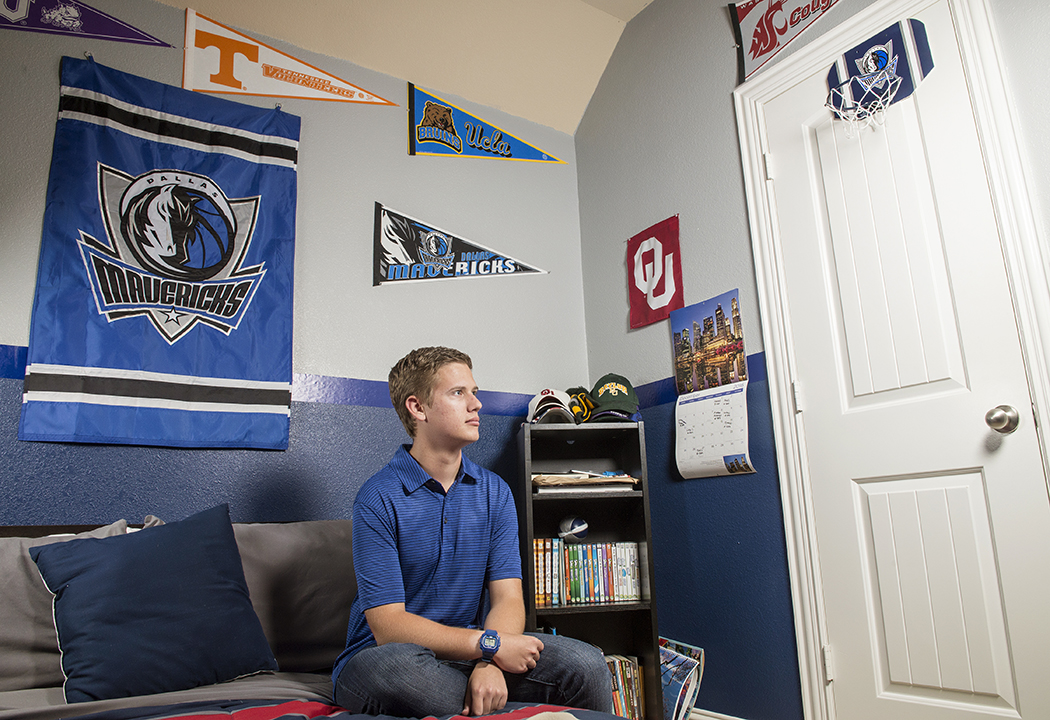
(Photo by Danny Fulgencio)
 Preston perseveres
Preston perseveres
1999 should have been a banner year for the Fitzgerald family. They had a new baby boy, Preston, and their eldest, Mackenzie, was starring alongside Natalie Portman and Ashley Judd in her first leading role at just 4 years old in the film “Where the Heart is.” Mother Cristina was on set in Austin when she noticed a funny twitch in Preston’s face. It was lightning quick, but it immediately set off her motherly instincts.
“I didn’t even know what a seizure looked like,” Cristina says, but she felt something was wrong with her 7-month-old son.
She took Preston to the emergency room at Breckenridge Hospital, where a series of tests would reveal that he had tuberous sclerosis complex (TSC), a rare and usually debilitating genetic condition that causes tumors to form in almost any organ, most specifically the brain, heart, kidneys and eyes. Tiny tumors had taken up residence in Preston’s brain, causing mild seizures.
“I call it my doomsday,” Cristina says.
She and her husband, Robert, faced more questions than answers. Like many genetic disorders, TSC can range from mild physical and cognitive dysfunction, to extremes where children are non-verbal, wheelchair bound and otherwise afflicted. Preston was too young to tell and there was no way of knowing how the disease would progress in his still-growing body. There was a 60 percent chance he’d never speak.
“No two cases are the same, there’s no one treatment for TS,” Robert says.
A TSC patient’s prognosis simply depends on where the tumors grow, and how large they become. “It’s like walking through a minefield, you don’t know what’s going to trigger,” Cristina says.
They decided not to dwell, and focused on giving Preston a normal childhood. They were fortunate; the condition is rarely diagnosed in infants. Early intervention meant the tumors’ growth could be better controlled. Preston struggled to learn things the way most children do, but it was soon clear he was one of the lucky ones.
“He’s the poster child for the best-case scenario,” Cristina says with clear relief in her voice.
It hasn’t been an easy road. His kidneys are pocked with tumors, and he’s had other tumors removed from his skin. Cognitively, it’s hard for him to remember all of the steps, so learning things like math and science has always been a challenge. Extensive therapies taught him how to overcome some of the damage the tumors cause in his brain, specifically when it comes to motor skills and balance.
He started playing soccer when he was 3 and did everything else a typical kid would do, just in his own way. But the older he got, the more he became aware of the differences that set him apart from other kids.
“It made me angry that it took me longer to do things than it did the other kids,” Preston remembers. “It was hard to fit in, I didn’t have any friends.”
By fourth-grade, he was in tears every day after school, a place he had grown to hate. His parents needed a better option. They found it in Dallas Academy, an East Dallas private school built by the Savage family of Swiss Avenue for students who learn differently, specifically their daughter, Dottie. It specializes in high-functioning autistic students and those with severe dyslexia, but prides itself on giving students a classic high school experience with sports, extra-curricular activities and school dances.
“Everyone else was different, too, so I felt OK,” Preston beams, adding that he started to enjoy school once he had teachers who taught him in a way he could understand. “The teachers, they actually wanted to help me and not just get frustrated that I wasn’t picking it up as quickly as the other kids.”
Health-wise, Preston just needs annual scans to check the size of his tumors. A daily chemotherapy pill helps to prevent new tumors from forming, and the existing ones from growing bigger.
It hasn’t held him back.
In addition to soccer, Preston picked up tennis his sophomore year and excelled at the sport, heading to the state finals last year. He’s quick with a joke and blessed with a biting wit. He loves to travel and recently returned from a school trip to Panama. Next year he’ll head to community college at either Eastfield or Richland, since he’s not quite ready to move away from home yet.
He hopes to study art and geography, two subjects in which he’s always excelled. There’s a famous story in the Fitzgerald family about the time Preston was at a friend’s birthday party when someone noticed he was spending an inordinate amount of time drawing in the corner. His parents realized he had sketched a near-perfect scale map of the entire metroplex, with such attention to details it included every highway and neighborhood boundaries.
“Everybody’s jaw just kind of dropped,” Cristina says, looking at the framed map on her wall.
“My friend was mad at me because I stole all the attention,” Preston says with a laugh.
Preston is well aware that his brain works differently than others, but it no longer bothers him.
“If I had a choice to get rid of [TSC], I wouldn’t,” he says. “because it makes me who I am today.”
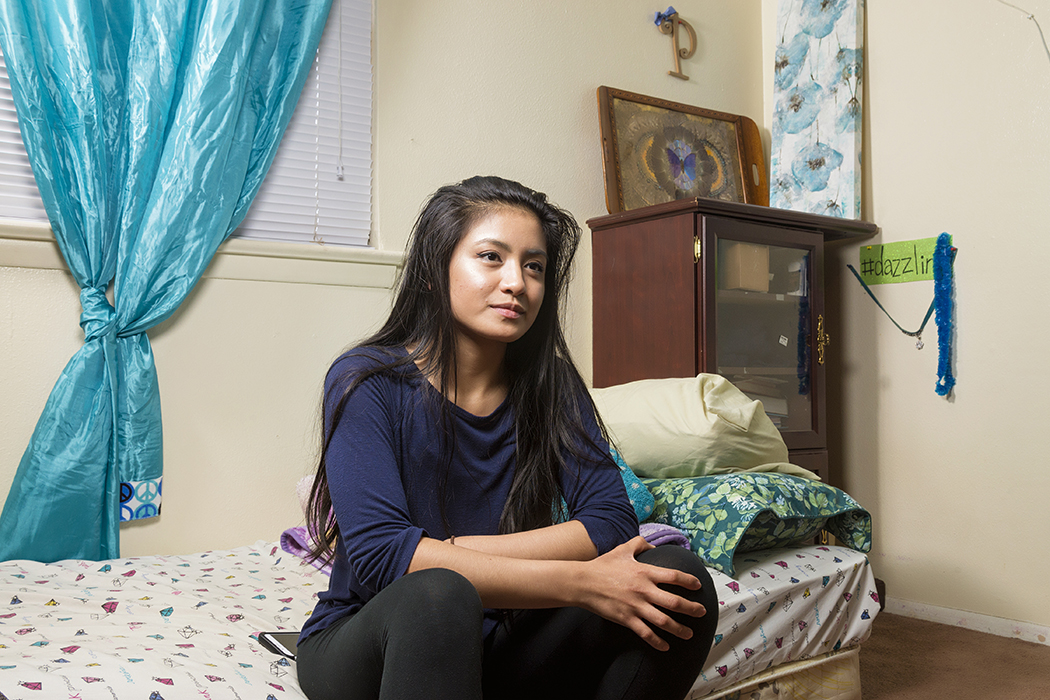
(Photo by Danny Fulgencio)
 Precymay’s persistence
Precymay’s persistence
Precymay Cabato danced the lead role of Clara in Woodrow Wilson High School’s annual “Nutcracker Short-n-Suite” showcase this past holiday season. She worked the stage with poise and style, clearly adept in her ability to emote through movement.
Despite her starring performance, she was likely one of the only students who didn’t have a parent in the audience to congratulate her.
“My parents have never seen me dance,” the 18-year-old says. “They think it’s a waste of time.”
As immigrants from the Philippines, they’ve spent so much of their life focused on just surviving they can’t seem to understand the need for extra-curricular activities. Precymay doesn’t ask her parents for rides to dance at this point. She’d rather walk the 30 minutes to rehearsal every morning, regardless of the weather.
“I get up at 5 a.m. and start walking at 6 a.m. so I’m not late,” she says.
Precymay has always been caught between two worlds with their own sets of expectations.
Growing up in the Philippines, her parents left her and her siblings with their grandparents while they pursued work overseas. Operating a small farm in a politically charged country wasn’t enough to feed their growing family. Precymay’s memories of the first 10 years of her life are mostly of struggle.
“It was heartbreaking,” she says of her parents leaving. “I didn’t feel like I had any support at that point.”
Life was harder in almost every way imaginable. She woke up at 4:30 a.m. to walk several miles from her small village into the nearby town where she could attend school. “There were like 60 kids in a class and we’d fight over torn-up books,” she remembers.
Once they saved up enough money, her parents returned to the Philippines to bring the children to their new home in Texas, where they had family in Carrollton. Precymay was 10.
The family soon settled into a modest apartment on Gaston Avenue where the living room doubles as a master bedroom. Precymay enrolled at J.L. Long Middle School. While she grew up learning English, along with her two native languages, she rarely spoke it, and classmates took notice.
“I didn’t really feel as welcomed as I thought I would,” she says. “They would mock me for the way I spoke. I was bullied to the point where I was depressed, to the point that I felt worthless.”
She didn’t find help at home. “When I talked to them about being bullied and I was crying, my mom scolded me.”
It wasn’t until she got to high school that Precymay found a place where she felt acceptance: the dance department at Woodrow Wilson High School. Dance teacher Lisa King immediately saw the potential in this new student and set out to foster her growth.
“Her outlet has been dance to help her cope with her demons to be a normal teenager at Woodrow,” King says. “The first time I saw her dance, I realized she was a tortured soul.”
Precymay found herself in dance. It was the first place she felt free to be expressive, and she learned to use her voice through motion. She thrived, becoming an officer with the school’s Sweetheart Drill Team where she regularly choreographs routines for her squad.
While teenage rebellion is an often-celebrated American tradition, the same cannot be said for the Philippines, where obedience is demanded, especially from daughters. It took an impassioned sense of self to stand up to her parents’ disapproval.
“It’s very hard to go against them, because in the Philippines we’re taught to just do what we’re told. I know they’re doing what they think is best, but they don’t really know me,” Precymay says. “We argue a lot because of who I am as a person.”
The same can be said for her future plans. Since coming to America, military service has been a key component of the Cabato family. It’s the price the next generation has to pay for college, which her parents say is too expensive. Precymay’s older sister followed her parents’ preferred path by enlisting in the U.S. Army after graduation, where she serves in Kuwait. She’s been witness to combat attacks and a fellow soldier’s suicide, experiences Precymay does not want.
“There’s a seriousness to her that I hadn’t seen before,” Precymay says.
Despite her parents’ desires, Precymay has decided to follow her dreams to attend college. She was accepted to UNT, where she plans to study biology, although she’s not sure what she wants to be quite yet. She hopes to join the dance team, and will always keep it as a side hobby, perhaps teaching children to dance from the heart, like King taught her.
“My parents scorned the idea of me being in dance. They told me it was a waste of time and I probably wouldn’t make it anyway,” Precymay says. “I had to pick myself up and do it for me.”
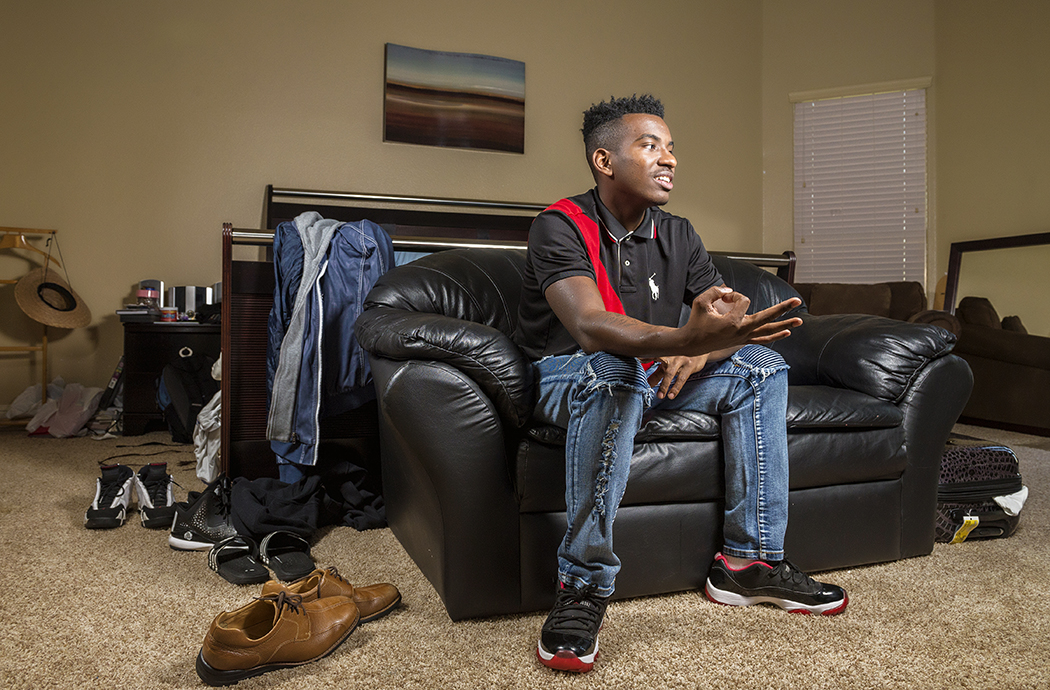
(Photo by Danny Fulgencio)
 Terry’s tenacity
Terry’s tenacity
Terry Carter got his first job when he was in the sixth grade, passing out sweet treats from an ice cream truck. He’s worked ever since at retail shops and eateries, anywhere that will give him a steady paycheck. He saved a portion of his money to buy chips and candy, which he sold to his classmates to make extra cash.
He does not shy away from hard work; his large family needs his support.
Terry is the third of eight children. With parents who work in a cafeteria, money was always tight. Government assistance programs such as food stamps helped fill the void, but the family constantly struggled to keep up with the bills. When Terry’s mother was evicted, she and her children moved in with grandparents, but living quarters were tight.
“I wanted to take some stress off [my mom],” Terry says.
Soon after he graduated from Alex W. Spence Talented/Gifted Academy, Terry decided to move in with his father and attend Woodrow Wilson High School. His father didn’t live with the family because of anger issues, which Terry experienced first-hand, although he doesn’t like to talk about it.
“It wasn’t like that, it was just man-to-man stuff,” he says, “[My father] always taught me right.”
Terry left after a few months to live with a friend, before moving in with his brother in Mesquite, but that house also was full. Earlier this school year, he finally found peace when he moved in with his best friend’s family in Cedar Hill, people he calls his godparents.
“He’s safe here, it’s stable,” says Felicia Richardson, his godmother.
Despite bouncing all over the metroplex, Terry kept his East Dallas roots and traveled as far as he needed to keep up his attendance at Woodrow, largely by bus for over an hour each day.
“It was hard, you never know when you’re just going to be in the same place. I knew it wasn’t supposed to be like this,” he says. “I just always told myself I wasn’t going to stop.”
He channeled the chaos of his life into rap lyrics, something he’s quick to dismiss as “just a hobby.” His words highlight the struggle he felt of growing up in poverty.
“I won’t hide/ The ways I tried/ It’s just not right/ It’s killing me tonight,” the chorus of his song “Intro” hauntingly repeats.
School was the place where he blossomed, because direct interaction with thoughtful teachers helped him flourish. He was never a standout student, but his willingness to work hard makes him memorable.
“He’s been taking care of himself most of his life,” Richardson says. “He has worked for every single thing that he’s earned, and he continues to work.”
That includes setting a family record as the first member to attend college. He initially planned on community college, but Richardson encouraged him to go for a four-year institution. Under her guidance, Terry was accepted into Prairie View A&M, although it took two tries.
“I told him to appeal the rejection,” Richardson says, “and he got in.”
Terry wants to pursue a degree in systems management, not so much because it interests him but because he knows it will be a lucrative field of study. He wants to find a good job so he can support his mom and baby sisters.
“I always thought things had to change. It has to,” he says. “I think that’s why I am so driven. To make that change for my family.”

(Photo by Danny Fulgencio)
 Luther’s limitless
Luther’s limitless
Luther Harris Jr. is the kind of person you want around when you travel, especially on a road or rail trip. The Dallas Academy senior is basically obsessed with transportation, and lightning quick at memorizing entire systems, just for fun.
“Because I’m so interested in travel, I’ve always been interested in roads and trains,” he says. “My goal is to become a civil engineer and build the largest high-speed rail system in America.”
Outside of exploring new cities, Luther likes to spend his free time watching the trains roll through the Dallas Area Rapid Transit station near his White Rock Lake-area home. Or going to public meetings to learn about upcoming road projects, where he sees things most audience members can’t. At one meeting, Luther found a safer and more efficient alternative for an overpass design on I-635.
“The engineer said, ‘You know what, you’re right.’ He couldn’t believe it,” says his father, Luther Harris Sr.
Sounds like a strange hobby for an 18-year-old, right? That’s Luther, he’s always been a bit of a conundrum. As a child, his intelligence was undeniable but he was constantly labeled as “different” by his teachers. He saw the world in his own way, which had both benefits and challenges — while he was gifted in certain areas, he didn’t learn to read until middle school and struggled with loud noises.
“In first grade, they diagnosed him with a pervasive development disorder not otherwise specified,” Luther Sr. says. “Later, they put him on the autism spectrum.”
At the time, Luther was a student at St. Philip’s School and Community Center in South Dallas, where he struggled to fit in — difference isn’t often celebrated in elementary school.
“Probably by third grade, the other kids realized my weird tendencies,” Luther says. “My teacher said I had friends but I was just playing along.”
Unequipped to deal with Luther’s unique educational and social needs, his parents moved him to Vanguard Preparatory School in Farmers Branch, a school specifically designed to teach autistic students. It quickly was apparent that Luther was higher functioning than most of his classmates.
“Being in a school that was majority autistic made me realize there was a problem,” Luther says. The school was more focused on teaching life skills rather than college readiness, “students weren’t really getting an education.”
That was not acceptable to Luther’s parents, who knew he was headed to college. A Stanford University test showed that Luther was off the charts in certain areas of understanding, so they focused on finding a school that would better prepare him for the future.
“The test showed he’s a spatial genius. He is, he is a genius,” Luther Sr. says. “[Vanguard] was too easy for him, he wasn’t being challenged.”
That’s when they found Dallas Academy, a school built for people like Luther who are college-bound but struggle with learning differences.
“I love it. It was like a normal high school,” Luther says. “I could connect with people.”
Finally, Luther found a school that would teach him the way he needed to learn. All students are prepared for college, and taught to advocate for their own success. With that support, Luther flourished, joining clubs, acting in plays and setting a record for the most college acceptance letters in the school, five in total, including Cornell University. Next fall, he’ll study pre-engineering at Missouri State because it gave him a generous scholarship. He hopes to finish his degree at the famed Missouri University of Science and Technology, where he was also accepted, although with lesser financial aid. He’s excited to move to a new city and meet new people, but he admits he’s nervous about sharing space in the dorms.
“I’m most worried about roommates,” he says. He’s highly sensitive to loud sounds, which can make communal living daunting. “Boys can be hard with that.”
His mother, Andrea, admits she’s a bit nervous for Luther to move away, but Luther Sr. doesn’t have any concerns.
“The main thing that will make him successful is that he has his own drive,” Luther Sr. says, adding that he sees big things in his son’s future.
“I’m going to retire off of [Luther],” he laughs.
 Shining star student
Shining star student
Heading to Harvard
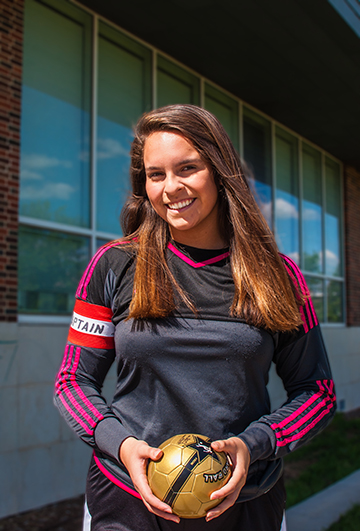 Gaby Munoz left soccer practice one December day, climbed into her car, checked her phone, and her life changed forever.
Gaby Munoz left soccer practice one December day, climbed into her car, checked her phone, and her life changed forever.
“It was so surreal,” she says, immediately correcting herself. “It was actually so overwhelming.”
It was the moment she found out her most ambitious dream to date had come true: She had been accepted to Harvard, a school that admits just 6 percent of its applicants.
Gaby is one of a record-breaking six Dallas ISD students to receive admission at the Cambridge institution. But she is the only one who came up in traditional high school, the other students came from the district’s prestigious magnet schools where such accomplishments are more commonplace. It’s been some years since a Woodrow Wilson High School student was accepted to Harvard, although no one seems to remember exactly how long.
This month, Gaby will address her classmates, teachers and the entire school community when she gives her valedictorian speech on graduation day. She has loved her scholastic career at Woodrow, where she danced with the Sweetheart drill team, played soccer, served as president of the National Honor Society and thrived in the International Baccalaureate program.
“I have met the most amazing people in high school, that’s what I’ll miss most,” she says.
Gaby credits her mom, Sandra Munoz, with pushing her to apply to the notoriously elite school. “I actually was never planning on applying,” she says. “But it was my mom who told me, ‘Why not? The worst they can do is say you didn’t get in.’ ”
She was elated when she got the acceptance letter, but that joy temporarily was quashed when she considered how to pay the $70,000 annual tuition (with room and board). Her parents, immigrants who brought her to America from her native Chile when she was 3, couldn’t pay that price. Relief soon came in the form of a financial aid package from the university that will cover nearly all of her annual expenses.
“I think my parents have to pay, like, $2,000 a year,” she says. “We couldn’t believe it, we were so excited.”
Harvard requires students to select a focus of study, and Gaby first considered law but ultimately decided she wanted more direct control over helping others. She will study human development and regenerative biology with plans to go on to medical school after she graduates Harvard.
“I want to be a surgeon, and I really like kids. So possibly a pediatric surgeon, that would be amazing,” she says. “The world needs more doctors, there can never be enough.”
She’s excited about her bright future ahead, but sad to leave her close-knit family, especially her mom, who has been her biggest supporter and the first person she called when she read her acceptance letter.
“She said, ‘I knew you’d get in.’ I said, ‘Mom, it doesn’t work that way, you don’t just get into Harvard.’ ”
But she did.



